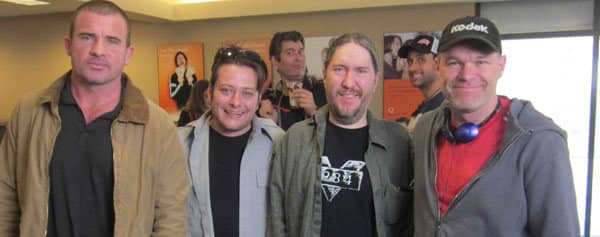
Think about the novelist Stephen King.
He’s very skilled at writing bestselling novels.
If that’s all he did, he’d be easily considered one of the most highly skilled authors of all time.
But Stephen King does more than just write successful novels.
He also writes books and gives talks about the writing industry and his specific genre. These additional contributions show that he’s competent in multiple ways that many authors are not.
I’ll give you more examples in a moment, but King provides a simple way to think about the difference because he’s both competent in the writing industry and skilled as a writer.
But it’s possible to be a competent expert about the history of publishing and what it takes to write a popular book without being able to write one yourself.
Indeed, creative writing programs around the world rely on this difference because few highly skilled writers are competent teachers. And they would much rather be writing.
With this key difference in mind, let’s have a deeper look at competencies vs skills.
The #1 Difference Between Competencies and Skills
The most important difference between competency and skill comes down to your goals and the concept of “scope.”
If your goal is to teach, then you might not need to work on the skill you want to teach.
Take music, for example. If you want to be a skilled performer, you will need so much deliberate practice as a performer, you won’t have time to practice being a teacher. Likewise if you want to be a recording artist – you have to practice recording in a studio in order to truly develop that skill.
When it comes to scope, you’ll go through many stages of learning based on your decision.
If you go for skill, the stages of learning will involve analyzing your specific weaknesses when it comes to performing the tasks related to the skill. Scope will involve many technical aspects related to specific goals tied to the performance of the skill.
When seeking competence, on the other hand, scope is much wider and more general. To stick with the example of music, you will not need to spend nearly as much time your musical chops as you will on understanding music theory, history and comparing and contrasting a variety of genres. Rick Beato is an example of someone who is basically skilled as a player of instruments like piano and guitar, and highly competent as a teacher of music.
As we’ve seen with Stephen King, it’s possible to be both highly skilled and competent, but it’s quite rare. In Stephen King’s case, even his demonstrations of competence are small compared to his demonstrations of skill. Out of all his books, only a minority are books about the industry (Danse Macabre and On Writing).
3 Examples of Competencies vs Skills
As we dive into a few additional skills and competencies examples, it might be useful to look at the origins of these terms.
Competency comes from a Latin word that means “meeting together, symmetry and agreement.” It’s a much broader concept than skills, which involves the knowledge and wisdom of how to do something.
With that in mind, here are some examples.
One: The Skilled Communicator
It’s ultimately a matter of taste, but many people are very skilled at delivering speeches and presentations.
But that doesn’t make them competent or skilled at writing them. Many speakers, politicians and even comedians hire writers.
To give an example of one person who was both a skilled speaker and highly competent at writing his messages, take a look at Winston Churchill.
Because he had both skill and competency, Churchill was able to influence millions of people and make history.
Two: Technical Skill
You’ve probably heard people debating over who was the better inventory: Edison or Tesla.
I’m not going to try and solve that argument here, but the point is that both were technically skilled.
But many would say that Edison was more competent in the market than Tesla, even if they were both technically skilled inventors.
Three: Competent Problem Solvers
Problem solving is much more of a competency than a skill because you often need to bring together people who have many different kinds of skills.
That, or you have to be a highly competent researcher.
Albert Einstein is probably one of the greatest problem solvers of all time. Even if physics still doesn’t have all of the answers, he was able to combine research skills with thinking, collaboration and raw talent to help his colleagues make huge strides. His influence is still felt today.
Which Are More Important: Competencies or Skills?
As we’ve seen, the choice of what to work on comes down to your goals.
You just want to make sure to avoid the truth in the famous cliche: those who cannot do, teach.
As I’ve argued, it’s perfectly possible to teach a topic competently. In fact, I taught Film Studies for years without being a filmmaker.
Eventually, I worked as a story consultant and even have a writer’s profile on the Internet Movie Database for my work in the field. It was cool to work on the set of a movie and have my name in the final credits of a movie.

But that opportunity ultimately came from a high competence in knowing what makes stories on the big screen great. It had little to do with my skill as an actual writer of screenplays.
4 Proven Tips to Improve Your Competencies and Skills
There are many ways to improve your competencies and skills. We’ve already mentioned deliberate practice above, so let’s dig deeper.
Be More Scientific
According to Tyler Cohen, author of Talent, we need to encourage people to learn how to make science better.
This suggestion is fascinating because all of the best performance gurus essentially urge us to become more scientific in how we improve our lives. I’ve said it in The Victorious Mind, James Clear says it in Atomic Habits and Abraham Maslow basically suggested it in his work on fulfilling your cognitive needs.
A simple way to get started is to keep a personal performance journal. If you want to improve your memory at the same time, Johannes Mallow has some great tips for using scientific principles in combination with journaling.
Get A Mentor
Few people who experience tremendous success do so without help from others.
You don’t have to necessarily find a wildly successful business person or top tier scholar – though I’ve done both myself and it is highly recommended. One of my mentors is also the creator of the incredible Cosmic Journal, which I highly recommend.
It’s also perfectly fine to seek peer mentors. This is something I also do, and it’s as simple as getting on regular calls with writers and entrepreneurs who are at a similar level as I am.
Also, it’s useful to do mentoring yourself, something I also do. I learn a lot by helping others.
Never Stop Learning
It’s tempting to put the books down and rest on your laurels after achieving a certain level of success.
But this is not recommended. In fact, this is a sure-fire way to rust your skills and reduce any competency you’ve developed.
I’m not suggesting that you “grind” 24/7. I’m just pointing out that it’s important to keep the chain well-oiled.
Which leads me to my next tip.
Exercise Your Memory
The easiest way to keep learning so that your skills and competencies keep growing is to keep your memory well-trained.
To do that, I suggest working with memory techniques like the Memory Palace and as many ancient memory strategies as you can.
If you’d like help, please feel free to grab my free memory improvement course:
It will give you the real deal memory techniques that give you both incredibly learning skills and competency in all the key areas of mental acuity that will make you a top performer in your field.
So what do you say?
Are you ready to work on improving both your skills and competencies?
Or have you decided to just become skilled in one particular area?
There’s no right or wrong.
What matters is that you experiment and explore until you find the right path for you.
And when your memory is highly skilled, you’ll be amazed by just how much time you’ll have for both.
Related Posts
- How To Improve Reasoning Skills: 5 Steps (With Examples)
It's easy to improve your reasoning skills. These detailed strategies and examples will help you…
- Episodic Memory vs. Semantic Memory: The Key Differences
Episodic and semantic memory are tied at the hip in one key way. But there…
- Implicit vs. Explicit Memory: The Key Differences
Implicit vs explicit memory have differences that are easy to understand. This simple guide will…





